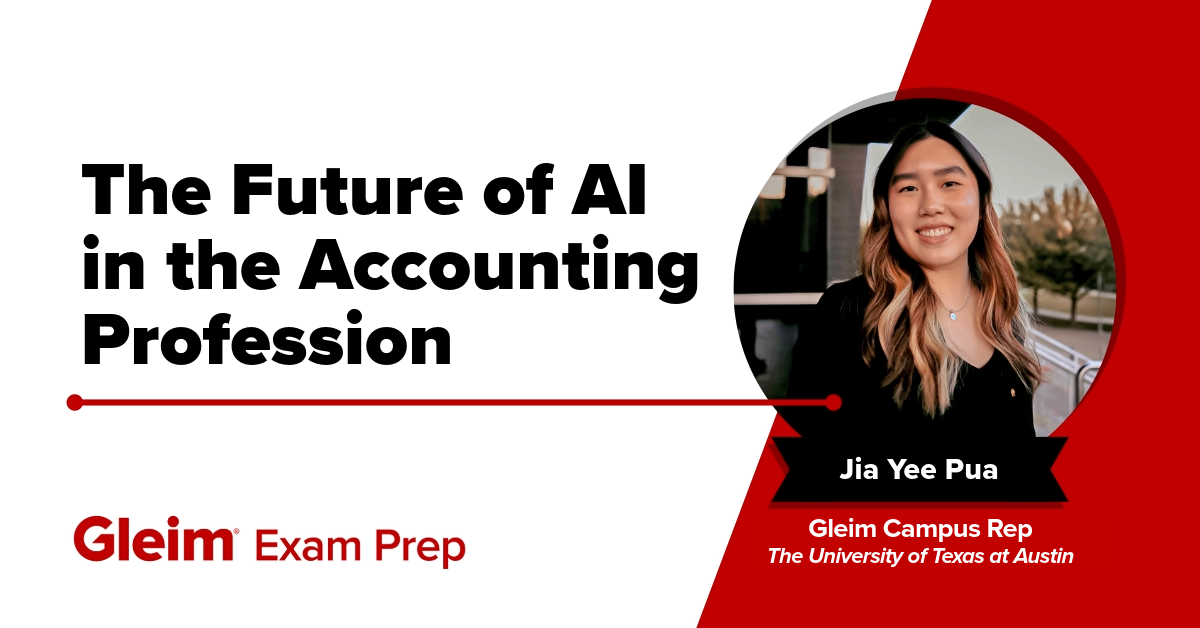Contact Us : 800.874.5346 International: +1 352.375.0772

I’m Jia Yee Pua, and I am a graduate student at The University of Texas at Austin. I am currently a Gleim Campus Rep and studying for the CPA exam. A highly discussed topic in my courses has been the future of artificial intelligence and its potential effects on the accounting profession.
The accounting profession is on the cusp of a technological transformation driven by artificial intelligence (AI), automation, and advanced data analytics. As technology develops, the industry has become increasingly reliant on digital tools, reshaping the role of accountants and the value they deliver. For this post, I’d like to touch on what industry firms have to say about the effects of AI in the accounting world.
One of the most immediate and visible impacts of AI in accounting is automation.
AI-powered platforms are streamlining routine tasks such as accounts payable/receivable processing, expense categorization, and bank reconciliations. These developments significantly reduce human error and allow professionals to focus on value-added activities. According to an article in The CPA Journal, the future of business data analytics and automation suggests that transactional accounting roles will diminish as AI becomes more capable of handling high-volume, rules-based processes (CPA Journal, 2024).
Furthermore, Robotic Process Automation (RPA) combined with machine learning enables systems to learn from patterns and make increasingly accurate predictions and classifications over time. This allows for near real-time financial reporting and predictive forecasting, functions that were once manual, retrospective, and time-consuming.
As automation takes over routine tasks, the role of the accountant is rapidly evolving into that of a strategic advisor. Professionals are now expected to interpret complex datasets, provide real-time insights, and support decision-making at the highest levels of an organization. The PwC report on the future of accounting emphasizes this shift, stating that the profession is becoming more advisory-focused, requiring skills in business strategy, communication, and technology alongside traditional financial acumen (PwC, 2024).
This transformation means that the value of the accountant is increasingly tied not to transactional output but to critical thinking and problem-solving. Firms are seeking talent capable of leveraging AI-generated insights to support client goals, manage risk, and create competitive advantage.
AI is particularly disruptive in the area of auditing, where traditional methods involve time-intensive sampling and manual testing. With AI and advanced analytics, auditors can now examine entire datasets rather than samples, increasing both accuracy and audit coverage. This comprehensive approach uncovers anomalies and trends that may have otherwise gone unnoticed.
According to The CPA Journal, automation tools can “read” documents, identify relevant data points, and even perform cognitive tasks such as risk assessments or controls testing (CPA Journal, 2024). This enhances the reliability of audits and frees up auditors to concentrate on higher-order tasks like interpreting the implications of findings and offering strategic recommendations.
AI is also transforming tax departments by automating compliance processes, streamlining data collection, and improving accuracy in tax return preparation. Natural language processing (NLP) can be used to interpret changing tax regulations across jurisdictions, while AI algorithms optimize tax planning strategies.
Moreover, AI can help companies proactively identify risks and opportunities, improving overall tax posture. The end result is not just operational efficiency but better-informed strategic planning that aligns with both regulatory requirements and corporate goals.
The modern accountant must now operate at the intersection of finance, data science, and technology. As AI systems generate vast volumes of data, the ability to interpret and derive actionable insights from this information becomes paramount. The EY article on the future of the accounting professional emphasizes the growing importance of digital fluency, data storytelling, and collaboration across disciplines (EY, 2024).
Today’s professionals are expected to understand how AI tools function, how to ensure data integrity, and how to apply ethical frameworks to algorithmic decision-making. These expectations mark a shift from traditional accounting education toward more interdisciplinary learning models that include courses in analytics, IT, and ethics.
With Gen Z entering the profession, the cultural and technological expectations of the workforce are also changing. EY notes that Gen Z professionals seek purpose-driven work, digital tools that enhance productivity, and ongoing development opportunities (EY, 2024). This generation is particularly receptive to AI integration, viewing it not as a threat but as a tool to improve outcomes and reduce drudgery.
To attract and retain young talent, firms must adapt their training programs, invest in up-to-date technology, and foster an environment of continuous learning. The future accountant will likely be a hybrid professional—part technologist, part analyst, part strategist—with AI serving as a powerful ally rather than a replacement.
While AI offers numerous benefits, it also presents ethical and regulatory challenges. Issues of data privacy, algorithmic bias, and understandability require careful attention. Accountants, as stewards of financial integrity, must ensure that AI systems adhere to ethical standards and support transparent decision-making.
My professors have consistently stressed that AI cannot and should not replace professional judgment. Instead, it should augment human expertise, providing tools that enhance accuracy, speed, and insight while preserving accountability. The profession must evolve with a clear understanding that trust remains its core currency.
In summary, AI is not merely an efficiency tool for the accounting profession—it is a transformative force reshaping its very foundation. From automation and auditing to tax and advisory services, AI is unlocking new possibilities for how accountants work and the value they deliver.
However, with this transformation comes the need for proactive adaptation. Professionals must embrace lifelong learning, firms must invest in digital infrastructure, and educators must revise curricula to meet evolving demands. The future of accounting is not about man versus machine—it is about how the two can work together to elevate the profession.
As PwC puts it, “The future of accounting is bright” (PwC, 2024). But it will belong to those who are prepared to lead through change, guided by both technological competence and human insight.